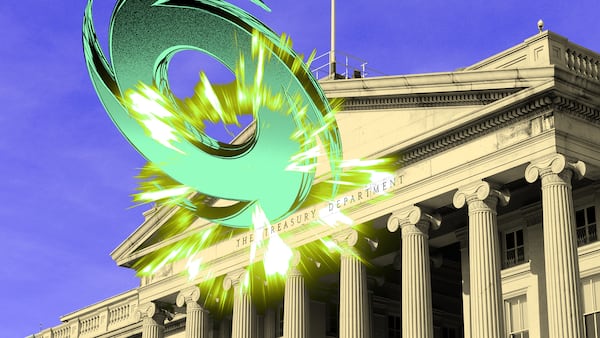- A Sky Mavis executive and former scammer testified on the first full day of Roman Storm’s trial.
- Crypto developers are attending the trial in a show of solidarity.
Validators, relayers, and private keys. Self-custody and “smart contract logic.” Decentralised autonomous organisations. HODL.
Jurors in the trial of Tornado Cash co-founder Roman Storm were buried under an avalanche of crypto jargon on Wednesday as prosecutors’ witnesses explained — or tried to explain — the basics of blockchain technology.
Those witnesses included Viet Anh Ho, the chief technology officer at Axie Infinity developer Sky Mavis, and 23-year-old Andre Llacuna, one of the people behind a $1.1 million NFT scam.
Their testimony continued prosecutors’ effort to show that Tornado Cash was the tool of choice for cybercriminals attempting to launder dirty crypto.
Storm has been charged with conspiracy to commit money laundering, operate an unlicensed money-transmitting business, and violate US sanctions. He faces 45 years in prison.
Testimony
Ho recalled how hackers affiliated with North Korea tricked a Sky Mavis employee into downloading malicious software.
The hackers then stole more than $600 million in crypto from the software bridge connecting Ethereum and Sky Mavis’ blockchain. Much of that crypto was laundered through Tornado Cash.
Llacuna detailed his own scheme to steal crypto worth more than $1 million in 2022.
That year, the young hairdresser and one of his clients created 8,888 NFTs featuring images of anthropomorphic scoops of ice cream called “Frosties.”
They drummed up interest in the project, promising would-be investors a Frosties-themed videogame and other features that could boost the NFTs’ price. They managed to sell all 8,888 Frosties for 0.04 Ether apiece — a total of $1.1 million.
Llacuna and his partners promptly deleted the Frosties website and social media accounts. Soon, they tried splitting their haul among fresh crypto wallets. But they realised that wouldn’t be enough to cover their tracks.
“It was obvious to us that no matter how many wallets we sent it in and out of, it would still be traceable,” he told jurors Wednesday.
One of Llacuna’s partners suggested they use Tornado Cash.
“It seemed like the best option for us to hide the money and get away with it,” he said.
Llacuna was arrested in March 2021. He pleaded guilty to two counts of fraud, but has yet to receive a sentence. He said Wednesday he was testifying in hopes he would receive a lenient sentence.
A third witness, Tornado Cash enthusiast Justin Bram, was asked to explain how the crypto mixer works.
Bram made an educational video about Tornado Cash in 2021 and soon began exchanging messages with the protocol’s co-founders. They eventually suggested he take a position co-managing a pool of Tornado Cash tokens that could be used to fund marketing initiatives or research.
Bram detailed its so-called relayer system, which makes crypto transfers untraceable. He explained how an “anonymity mining” program offered Tornado Cash tokens to people who deposited and left their crypto in the protocol, beefing its transaction-cloaking capabilities.
Bram said he ended his Tornado Cash affiliation in 2021 because “the regulatory climate was heating up.”
Hackers were sending money to Tornado Cash, “and it seemed like a bad look,” he said Wednesday.
But he also said the protocol provides a key service for Ethereum users who want or need privacy. And Storm had never asked him to make videos “pitching Tornado Cash to money launderers.”
‘Moment of radicalisation’
Storm’s attorneys, in turn, continued their attempt to reframe Tornado Cash in jurors’ minds.
It was not a tool built for and marketed to money launderers, Storm’s attorneys suggested, but a tool for the privacy-conscious that was simply misused by cybercriminals.
Under questioning from one of Storm’s attorneys, Llacuna acknowledged Tornado Cash was easy to find online — not some forbidden software he had to use the so-called dark web to access.
Indeed, US citizens can legally use the crypto mixer. But that wasn’t always the case: In 2022, the US sanctioned Tornado Cash, making it a crime for any US citizen to use the protocol.
“The original Tornado Cash blacklist by OFAC was sort of a moment of radicalisation for me,” Tim Clancy, a member of the Silviculture Society, a group that advises the Ethereum Foundation, told DL News outside Storm’s courtroom Wednesday.
“Tornado Cash was filling an extremely valuable role.”
The sanctions were lifted this year after a group of Tornado Cash users successfully challenged them in court. A federal appellate judge found the government did not have the authority to sanction self-executing software that was, for all intents and purposes, owner-less.
That Storm still faces a decades-long prison sentence is a grave injustice, Clancy said. He traveled from Boston to support the embattled software developer.
Clancy wasn’t the only person who traveled in a show of solidarity. Storm has become a cause célèbre among crypto enthusiasts, who consider his prosecution an attempt to stifle the development of privacy-preserving software.
HAI developer Ameen Soleimani was in attendance Wednesday, and other notable crypto developers and enthusiasts plan on attending Storm’s trial in the coming days.
Clancy said he has personally donated more than $100,000 to Storm’s defence — and has a plan to donate more.
On Wednesday, he brought a copy of “PGP: Source Code and Internals,” a book by software engineer Philip Zimmermann.
While Zimmermann never faced criminal charges, he became a target for US authorities in the 1990s after publishing online the source code for his Pretty Good Privacy encryption protocol.
Clancy spent $600 to buy the book, he said. After just one print run, it has become hard to find.
He intends to ask Storm to sign the book. If Clancy succeeds, he’ll auction the signed book and donate the proceeds to Storm’s defence, he said.
“We don’t want him to be martyred,” Clancy said.
Aleks Gilbert is DL News’ New York-based DeFi correspondent. You can reach him at aleks@dlnews.com.





